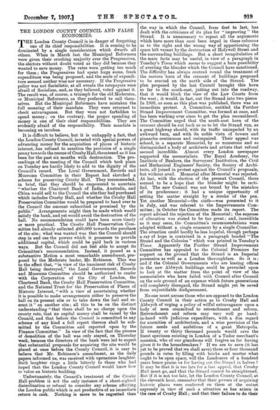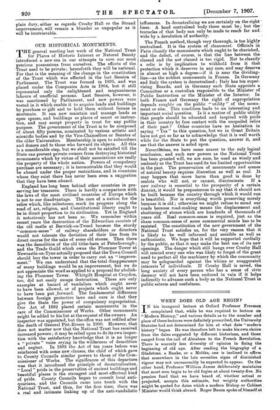THE LONDON COUNTY COUNCIL AND FALSE ECONOMIES.
THE London County Council is in danger of forgetting one of its chief responsibilities. It is coming to be dominated by a single consideration which dwarfs all others. When in March last the Municipal Reformers were given their crushing majority over the Progressives, the electors without doubt voted as they did because they wanted to save money. The rates were getting too much for them ; the Progressives had spent huge sums, fresh expenditure was being proposed, and the scale of expendi- ture seemed neither wise nor necessary. If the Progressive policy was not Socialistic, at all events the ratepayers were afraid of Socialism, and, as they believed, voted against it. The result was, of course, a triumph for the old Moderates, or Municipal Reformers, as they preferred to call them- selves. But the Municipal Reformers have mistaken the full meaning of their mandate. They were returned to check extravagance. But they were not forbidden to spend money ; on the contrary, the proper spending of money is one of their chief responsibilities. They are evidently afraid of the responsibility. Their mandate is becoming an incubus.
It is difficult to believe, but it is unhappily a fact, that the London County Council, invested with special powers of advancing money for the acquisition of places of historic interest, has refused to sanction the provision of a. single penny towards the rescue of Crosby Hall, threatened as it has been for the past six months with destruction. The pro- ceedings of the meeting of the Council which took place on Tuesday are hardly likely to add to the dignity of the Council's record. The Local Government, Records and Museums Committee in their Report had sketched a scheme for preserving Crosby Hall. They recommended, in brief, that they should be empowered to ascertain "whether the Chartered Bank of India, Australia, and China would sell to the Council the site they had purchased which includes Crosby Hall, and whether the Crosby Hall Preservation Committee would be prepared to hand over to the Council the amount subscribed or promised by the public." Arrangements might then be made which would satisfy the bank, and yet would avoid the destruction of the ball. No recommendation could have been more timely or more practical. The Crosby Hall Preservation Com- mittee had already collected £60,000 towards the purchase of the site ; what was wanted was that the Council should step in and use the powers which it possesses to provide additional capital, which could be paid back in various ways. But the Council did not feel able to accept its Committee's recommendation. Instead, it passed as a substantive Motion a most remarkable amendment, pro-- posed by the Moderate leader, Mr. Robinson. This was to the effect that, "in view of the imminent risk of Crosby Hall being destroyed," the Local Government, Records and Museums Committee should be authorised to confer with the Corporation of the City of London, the Chartered Bank, the Crosby Hall Preservation Committee, and the National Trust for the Preservation of Places of Historic Interest, " with a view of ascertaining whether it is possible to make arrangements either to preserve the hall on its present site or to take down the hall and re- erect it" on another site; all this to be on the distinct understanding "that there shall be no charge upon the county rate, that no capital money shall be raised by the Council, and that before the Council is committed to any scheme of any kind a full report thereon shall be sub- mitted. by the Committee and reported upon by the Finance Committee." In view of the fact that the process of demolition of the hall was only stayed, on Thursday week, because the directors of the bank were led to expect that substantial proposals for acquiring the site would be placed at once before the County Council, it is easy to believe that 'Mr. Robinson's amendment, as the daily papers informed, us, was received with uproarious laughter. Such laughter rings a little bitterly to those who had hoped that the London County Council would know how to value an historic building.
• Unfortunately, the Council's treatment of the Crosby Hall problem is' not the only instance of a short-sighted disinclination or refusal to consider any scheme affecting the London public which is not productive of an immediate return in cash. Nothing is more to be regretted than the way in which the Council, from first to last, has dealt with the criticisms of its plan for " improving " the Strand. It is unnecessary to repeat all the arguments which have more than once been urged in these columns as to the right and the wrong way of apportioning the space left vacant by the destruction of. Holywell Street and the surrounding buildings. But a, short recapitulation of the main facts may be useful, in view of a paragraph in Tuesday's Times which seems to suggest a bare possibility of averting the blunder which the Council have sanctioned. The difficulty has always centred round the treatment of the eastern horn of the crescent of buildings proposed to be erected on the north side of the Strand. The plan proposed by the last Council brought this horn so far to the south-east, jutting out into the roadway, that it would block the view of the Law Courts from the west ; it would, in fact, cut the Strand into two pieces In 1903, as soon as this plan was published, there was an immediate protest. A Committee, entitled the Further Strand Improvement Committee, was formed at once, and has been working ever since to get the plan reconsidered. The Committee urged that the south-east horn of the crescent should be cut back so as to let the Strand run, as a great highway should, with its traffic unimpeded by an awkward turn, and with its noble vista of towers and pinnacles continuous and unimpaired. Their appeal was echoed, in a separate Memorial, by so numerous and so distinguished a body of architects and artists that refusal seemed incredible. Almost every London newspaper supported the memorialists. The Royal Academy, the Institute of Bankers, the Surveyors' Institution, the Civil and Mechanical Engineers' Society, the Society of Archi- tects, all joined in protest against the Council's proposals1 but without avail. Memorial after Memorial was rejected. At last, with the election of the present Council, there seemed to, be a hope that the blunder might be recti- fied. The new Council was not bound by the mistakes of its predecessor; it had a unique opportunity of setting the matter straight by a stroke of the pen. Yet another Memorial—the sixth—was presented to it in July, and was referred to the Improvements Com- mittee; in October the Committee made its report. The report advised the rejection• of the Memorial ; the expense of alteration was stated to be too great ; and, incredible as it may seem, the Committee's recommendations were adopted without a single comment by a single Councillor. The situation could hardly be less hopeful, though perhaps a, ray of hope is contained in a paragraph headed " The Strand and the Colonies " which was printed in Tuesday's Times. Apparently the Further Strand Improvement Committee has appealed to the Colonial Premiers for support on the ground that the Strand is an Imperial possession as well as a London thoroughfare. So it is; and if the Colonial Governments who are leasing offices in the new Aldwych buildings could be prevailed upon to look at the matter from the point of view of the memorialists who have failed with Council after Council on the sole ground of an expense which future generations will completely disregard, the Strand might yet be saved from unjustifiable disfigurement.
No one must accuse those who are opposed to the London County Council in their action as to Crosby Hall and Aldwych of urging a, policy of wilful extravagance upon a body of men committed to retrenchment and reform. Retrenchment and reform may very well go hand. in-hand with judicious expenditure, with a due regard for amenities of architecture, and a wise prevision of the future needs and ambitions of a great Metropolis. If twenty or thirty thousand pounds would save the finest specimen existing in London of a Tudor merchant's mansion, who of our grandsons will forgive us for having given it to the housebreakers ? If we are to save (it has yet to be proved that we shall save) three or four thousand pounds in rates by filling with bricks and mortar what ought to be open space, will the Londoners of a hundred years hence praise us for having cut the Strand in halves ? It may be that it is too late for a last appeal, that. Crosby Hall must go, and that the Strand cannot be straightened. But if it is not too late, let the London County Council, at the eleventh hour, remember that their powers of acquiring historic places were conferred on them at the outset expressly in view of such a situation as has arisen in the case of Crosby Hall ; -and that their failure to do their plain duty, either as regards Crosby Hall or the Strand improvement, will' remain a blunder as unpopular as it will be irretrievable.











































































 Previous page
Previous page